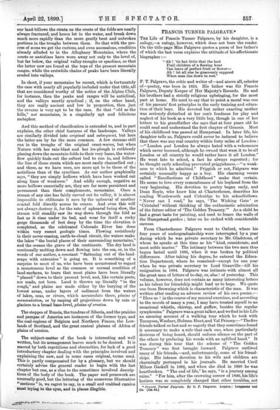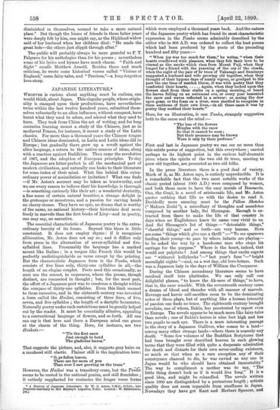PRANCIS TURNER PALGRAVE.* THE Life of Francis Turner Pidgmve, by
his daughter, is a eulogy,-1, -eulogy, however, which does not bore the reader. On the title-page Miss Palgrave quotes a poem of her father's of which the last verse explains the attitude of his affectionate biographer :— " Ah I 'tis but little that the best Frail children of a fleeting hour Can leave of perfect fruit or flower—. Ah I let all else be graciously eupprest When man lies down to rest.'
F. T. Palgrave, the critic and writer of—and above all, selector of—poetry, was born in 1824. His father was Sir Francis Palgrave, Deputy Keeper of Her Majesty's Records. He and his brothers had a strictly religious upbringing, for the most part at home. He used to say that to point a moral was one of his parents' first principles in the early training and educa- tion of their boys. His devoted but rather exacting mother was seriously disturbed at her son's fondness for play and neglect of his book as a very little boy, though in one of her letters to his grandfather she says that at four years old he could read and understand the first chapter of Genesis. Most of his childhood was passed at Hampstead. - In later life, his daughter tells us, Palgrave could never be induced to believe that there was any real country within forty miles of London : —" London qua London he always hated with a vehemence which never lessened, although he owned that were it to be all London or all country he would rather have it all London." He went late to school, a fact he always regretted ; for he thought early schooling prevented priggishness,—" a weak- ness to which he admitted." Priggish or not, Palgrave was certainly unusually happy as a boy. His charming verses called "Recollections of Childhood" make that certain. He seems to love every remembrance of his boyhood from the very beginning. His devotion to poetry began early, and Dean Boyle, who knew him at Charterhouse, describes his reading Wordsworth and Coleridge to his schoolfellows. "Never can I read," he says, 'The Wishing Gate' or Cristabel ' without thinking of the enthusiastic admiration of the future editor of 'The Golden Treasury." As a child he had a great taste for painting, and used to fresco the walls of the Hampstead garden ; later on he etched with considerable success.
From Charterhouse Palgrave went to Oxford, where his four years of undergraduateship were interrupted by a year during which he was private secretary to Mr. Gladstone, of whom he speaks at this time as his "kind, considerate, and most noble master." The intimacy between the two men thus begun lasted until 1885, when it was broken by political differences. After taking his degree, he entered the Educa- tion Department, where he remained—except for one year when he was private secretary to Lord Granville—till his resignation in 1884. Palgrave was intimate with almost all the great men of letters of to-day, or, alas ! of yesterday. This volume, however, does not contain as many interesting letters as his talent for friendship might lead us to hope. We quote one from Browning which is characteristic of the man. It was written after reading an adverse review of his own poems :— "Bless us ! in the course of my musical exercises, and according to the moods of many a year, I may have treated myself to an occasional whistle, chirrup, and guffaw, besides the regular symphonies." Palgrave was a great talker, and we find in his Life an amusing account of a walking tour which he took with Tennyson, Woolner, Holman Hunt, and Val Prinsep:—"Thefive friends talked so fast and so eagerly that they sometimes found it necessary to make a rule that each one, when particularly desirous of being heard, should enforce silence on the part of the others by prefacing his words with an uplifted hand." It was during this tour that the scheme of "The Golden Treasury" was first brought forward. Palgrave outlived many of his friends,—and, unfortunately, some of his friend- ships. His intense devotion to his wife and children are charmingly portrayed in his journals. He married Cecil Milnes Gaskell in 1862_, and when she died in ,1890 he was heartbroken. "The end of life," he says, "is a journey among ruins." "For him, after the crowning sorrow of 1890, his life's horizon was so completely changed that other troubles, not • Fronds Turner Palgrave. By G. F. Palgrave. London : Longmant 'and
Co. RCM ed.3 •
diminished in themselves, seemed to take a more natural place." But though the losses of friends in these latter years were deeply felt by him, one might say, as the Highland widow said of her husband when her children died: "He made the great hole—the others just slippit through after."
The public will probably always be more grateful to F. T. Palgrave for his anthologies than for his poems ; nevertheless some of his lyrics and hymns have much charm. "Faith and Sight" recalls Matthew Arnold. Besides these and much criticism, he wrote some historical verses called "Visions of England," some fairy-tales, and " Preciosa,"—a long-forgotten love-story.







































 Previous page
Previous page